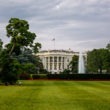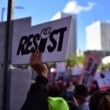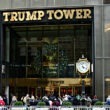It was at the first meeting of the Presidential Commission on Election Integrity that Donald Trump asked the question, “What do they have to hide?” He was referring to the state election officials who refused to turn over voter records sought by the Commission. That Commission had been established by the president ostensibly to gather evidence of election fraud. The irony of the president’s statement was not lost on many who had wondered why candidate Trump had refused to release his tax returns during the campaign. “What does he have to hide?” is a question that should be asked of the president with increased urgency as each day of his administration passes.
But there is more than irony at issue in the president’s assertion of the Commission’s authority to obtain state voter records and his refusal to disclose his own tax records. It is in fact an inverted view of liberty, at odds with modern constitutional democracies that now confront the enormous power of personal data—both when it should be safeguarded and when it should be disclosed. Congress faced this issue directly following Richard Nixon’s presidency. Nixon had used the powers of his office to obtain government records from the IRS and the FBI on his political opponents. He wiretapped aides whom he suspected of disloyalty. And he was enormously secretive about his own conduct.
Nixon’s misuse of government powers and, more precisely, the information maintained by government agencies sent a clear message to lawmakers. The Congress of 1974 enacted the federal Privacy Act to safeguard the personal information retained by government agencies, and Congress strengthened the Freedom of Information Act to ensure greater transparency and accountability for government conduct.
There was no contradiction in the effort to promote privacy and openness: in the asymmetry of power that is the modern political state, individuals must be protected against the misuse of personal data while government officials must be held to account. Thus, privacy and openness operate as twin pillars that sustain modern democratic governments. And the reverse is easily observed in countries lacking strong democratic institutions—surveillance of the public, secrecy for the leaders. We call such countries “authoritarian.”
From this perspective, the first six months of the Trump presidency provide a model for a new authoritarianism, one that seeks to make information about the public more transparent while extending secrecy for leaders. Consider, for example, the president’s efforts to go after journalists and leakers. It is his privacy and the privacy of information about him that he is seeking to protect. Or consider the president’s instinct to make the private matters of others public. Trump did this often during the campaign and continues the tactic in tweets about political opponents, journalists, and others he does not like. His communications are intended to embarrass or shame based on the release of private facts. It is a technique favored by the notorious human rights opponent Philippine President Rodrigo Duterte.
Although Trump has kept his financial records secret, he has shown little regard for the privacy rights of Americans.
Long before the Presidential Commission thought it had the authority to collect the voter records of registered voters across the country, Trump had picked for attorney general one of the few members of the U.S. Senate who had opposed the USA Freedom Act, which reined in the mass surveillance of domestic communications revealed by Edward Snowden. He chose for director of the CIA a former House member who also suggested that the powers for mass surveillance should be restored. And his executive order on immigration included provisions to expand the use of biometrics at the border. Meanwhile, the Privacy and Civil Liberties Oversight Board, a key agency established to check the powers of the presidency after September 11, remains without enough members to exercise legal authority. And the Federal Trade Commission, also crucial to the protection of the privacy interests of the American public, is barely functioning.
If it is correct that the modern democratic state is sustained by privacy protections for citizens and transparency obligations for officials, then future actions by this administration on these issues require close attention. In the new authoritarianism, political leaders will be less likely to arrest political opponents and more inclined to rely on the continued inversion of privacy and openness. The administration will reach for the private data that sustains democratic institutions even as it shields its own business conduct that should be routinely available to the public. And when a president seeks to protect his financial activities while trying to obtain voter records from state election officials, alarms should go off. The Congress that followed the Nixon presidency understood the risks of such a government.
Marc Rotenberg is president of the Electronic Privacy Information Center in Washington, D.C. EPIC has sued both the Presidential Election Commission to block the release of state voter records and the IRS to compel the release of Donald Trump’s tax records.







0 Comments